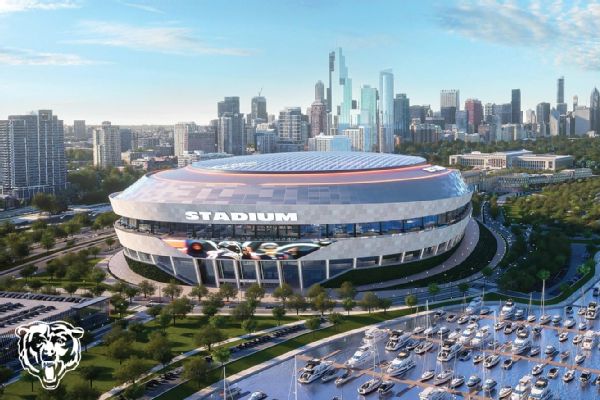
Posted on May 02


Posted on May 02

u/alex •

u/alex •
CHICAGO, IL -- The proposal for a new lakefront stadium by the Chicago Bears, funded by public money, is facing significant opposition from the office of Illinois Governor J.B. Pritzker. The Bears recently unveiled a $5 billion plan for an enclosed facility next to Soldier Field, but the governor's office sees it as a "nonstarter" unless clear benefits are demonstrated for taxpayers.
The Bears' ambitious plan includes allocating $3.2 billion for the construction of the stadium and an additional $1.5 billion for infrastructure improvements. Under this proposal, the funding would involve a contribution of $2.025 billion from the Bears themselves, $300 million from an NFL loan, and $900 million in bonds from the Illinois Sports Facilities Authority.
While Mayor Brandon Johnson expressed his support for the project, Governor Pritzker and other state legislators remain skeptical about the financial implications of the proposed stadium. Press Secretary Alex Gough emphasized the importance of responsible fiscal stewardship, stating, "As the Governor has said, the current proposal is a non-starter for the state... responsible fiscal stewardship of taxpayer dollars remains the foremost priority."
It is worth noting that the Bears had previously explored the possibility of constructing a stadium in Arlington Heights. However, they encountered obstacles due to high property assessments, which ultimately led to the reconsideration of alternative options.
Despite the differing opinions surrounding the funding and construction of the new stadium, both the Bears and the governor's office have expressed their commitment to protecting the interests of taxpayers. The Bears stated, "We share a commitment to protecting the taxpayers of Illinois and look forward to further discussions."
The fate of the Bears' proposal and the potential construction of a new lakefront stadium hang in the balance as negotiations and deliberations continue between the team, government officials, and other stakeholders. The outcome of these discussions will have significant implications for the future of professional football in Chicago and the state of Illinois as a whole.
CHICAGO, IL -- The proposal for a new lakefront stadium by the Chicago Bears, funded by public money, is facing significant opposition from the office of Illinois Governor J.B. Pritzker. The Bears recently unveiled a $5 billion plan for an enclosed facility next to Soldier Field, but the governor's office sees it as a "nonstarter" unless clear benefits are demonstrated for taxpayers.
The Bears' ambitious plan includes allocating $3.2 billion for the construction of the stadium and an additional $1.5 billion for infrastructure improvements. Under this proposal, the funding would involve a contribution of $2.025 billion from the Bears themselves, $300 million from an NFL loan, and $900 million in bonds from the Illinois Sports Facilities Authority.
While Mayor Brandon Johnson expressed his support for the project, Governor Pritzker and other state legislators remain skeptical about the financial implications of the proposed stadium. Press Secretary Alex Gough emphasized the importance of responsible fiscal stewardship, stating, "As the Governor has said, the current proposal is a non-starter for the state... responsible fiscal stewardship of taxpayer dollars remains the foremost priority."
It is worth noting that the Bears had previously explored the possibility of constructing a stadium in Arlington Heights. However, they encountered obstacles due to high property assessments, which ultimately led to the reconsideration of alternative options.
Despite the differing opinions surrounding the funding and construction of the new stadium, both the Bears and the governor's office have expressed their commitment to protecting the interests of taxpayers. The Bears stated, "We share a commitment to protecting the taxpayers of Illinois and look forward to further discussions."
The fate of the Bears' proposal and the potential construction of a new lakefront stadium hang in the balance as negotiations and deliberations continue between the team, government officials, and other stakeholders. The outcome of these discussions will have significant implications for the future of professional football in Chicago and the state of Illinois as a whole.